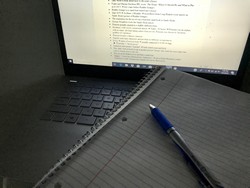To reach the ultimate success during finals season, it is necessary to have a solid studying plan. The key is to plan in advance.
“Studying for finals, you will catch me at 5 a.m. in my room studying,” said Adham Hasan, a senior health studies student.
Hasan feels that accomplishing class obligations in a timely manner and being rested is a benefit to a successful performance on final exams. “Instead of staying up late at night, go to bed early and wake up early,” said Hasan.
“I usually start studying for finals two weeks prior to my final exams, and I try to average fifteen to twenty hours per week,” said Bryan Ochoa, a senior criminal justice student.
“Meeting with professors is very beneficial, especially during final exams. Although I am doing well in all of my classes, I just need to make sure my average does not get knocked down from to a B+ or B range,” said Ochoa.
Junior political science student Joe Raimondi also believes meeting with professors is an advantage. “I have met with professors before to go over study guides and it has been beneficial,” said Raimondi.
It is crucial to still give yourself breaks to relax. “I would definitely say that free time is beneficial for the process of studying because it just keeps me from getting overwhelmed and takes out my stress during finals week,” added Raimondi.
Ochoa also finds free time to be important during final exams. “I play soccer a lot during my free time, and I started playing basketball more,” said Ochoa.
It is always encouraged to have great expectations, dreams, and aspirations. “My greatest motivation for succeeding on finals would be going to law school because I want to be a lawyer,” said Raimondi.
“I want to get high enough grades so schools can accept any where I want to go,” he added.
Michael Phillips-Anderson, an associate professor of communication, discussed how he structures his final exams. “Some of my classes have a regular final exam and some of them we do presentations during final exam period. When they have a regular exam, I usually give them a pretty detailed study guide that reflects the main ideas from the reading and what we talked about in class,” Phillips-Anderson said.
He also believes that students should think as if they are the professor. “You should try to think about how the professor would ask a question,” said Anderson.
Phillips-Anderson finds it useful when a class has taken a midterm exam before the final because students gain an idea of the questions that will most likely be asked. “The questions on the midterm will probably be similar to the ones on the final,” he said.
In contrast to Ochoa and Raimondi, Phillips-Anderson almost never finds students meeting with him during the final exams period.
“I am available, have regular office hours, and also meet with students whenever they want to, but very few of them ever do. I would definitely suggest meeting with your professor at least once during the semester,” Phillips-Anderson said.
Phillips-Anderson feels that if a student has done the reading, came to class, paid attention, and put in some sincere effort in trying to prepare for an exam, then they should pass. He said, “I want everybody to pass, and I want to give every opportunity to do so, but if they don’t do the reading then there is not much I can do about that.”
“In general, I think the kind of preparation for an exam is the same kind of preparation if you were going on a job interview. You need to understand the important issues, and you should do research to have some sense of what they might ask you,” Phillips-Anderson continued.
Overall, make sure that you put in the proper amount of study time this semester, in order to ensure that you do well on your final exams. The main tips are to avoid procrastination and study hard, but leave yourself some time to relax too.
PHOTO TAKEN by Jenna Puglisi



